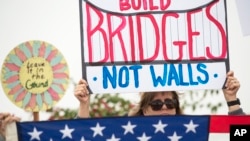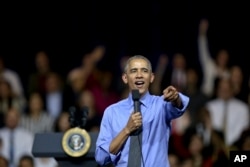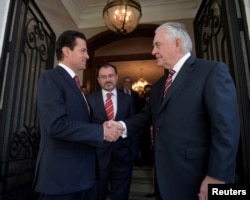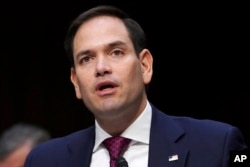U.S. President Donald Trump, who has disparaged Latin American countries over immigration, narcotics and trade, heads to the region this week for a summit that diplomats say is likely to be awkward and tense.
Trump will arrive in the Peruvian capital, Lima, on Friday for the Summit of the Americas with an agenda of encouraging commercial ties and urging allies to take a hard line on Venezuela, according to U.S. officials who briefed reporters on the trip.
But the U.S. president's divisive rhetoric and fraught relationships with leaders such as Mexican President Enrique Pena Nieto make it unlikely he will make big strides toward his goals, experts said.
"He is going in profoundly unpopular in the region, and that obviously complicates the ability of leaders to work with him," said Mark Feierstein, who managed hemispheric issues for President Barack Obama's White House, and is now an adviser with the Albright Stonebridge Group.
The visit is stirring nostalgia for Obama, the Republican president's Democratic predecessor, a Peruvian diplomat said.
The diplomat added, however: "Nobody has lost any sleep over Trump," saying: "We all know how to smile and nod along, so we're not too worried."
Trump has complained about U.S. job losses to Mexico, threatened to rip up the North American Free Trade Agreement with Mexico and Canada and began his presidential bid with a speech describing Mexican immigrants as "rapists" and drug dealers.
Trump has also taken aim at migration from Nicaragua, Honduras, El Salvador and other Latin American countries and threatened to cut off aid to Colombia and Peru over the drug trade.
As he prepares for his trip, which includes a stop in Colombia after the summit, Trump has ramped up his rhetoric on illegal immigration with a plan to send National Guard troops to the U.S. border with Mexico.
Unpopular in region
Mexico's Pena Nieto on Monday ordered a review of all cooperation with the United States, a sign of growing frustration with Trump. Many Mexicans want to see their government take a harder line.
After Trump's first year in office, only 16 percent of poll respondents in Latin America approved of Trump's performance, according to Gallup.
Sergio Montenegro, 40, who works at an insurance company in Lima, compared Trump with some populist leaders who gained power in Latin America in recent decades.
"Being loud, always at the center of attention, constant scandals ... that's been our reality for many years," Montalvo said. "The United States isn't respected as much now ... before, whatever Americans said seemed to be the right thing - the voice of reason. Now whatever they say is questioned."
Asked about how confrontational Trump might be at the summit and if there was discussion about countering his low regional popularity, a U.S. official on the briefing said: "He speaks what's on his mind. And I think he will speak to issues of shared values and shared goals within the region."
A source in the Brazilian government told Reuters on condition of anonymity that a positive agenda from Washington "is badly needed if the Trump administration wants to keep productive relations with the region."
At the summit, leaders will try to build consensus around cracking down on corruption in the region, a theme brought into focus last month by the resignation of Peru's former president, Pedro Pablo Kuczynski, over ties to a scandal involving Brazilian construction conglomerate Odebrecht.
Venezuela
The White House also wants to turn up regional pressure on Venezuela's socialist president, Nicolas Maduro - disinvited from the summit - who called an election for May that his opposition and Washington have cast as a sham. Hundreds of thousands of Venezuelans have fled to Colombia and other neighboring countries to escape hunger and poverty.
Republican Senator Marco Rubio is set to meet with Trump on Wednesday before the trip to urge more humanitarian aid for Venezuelans, tougher financial and economic sanctions on Maduro, and to "lay the groundwork for an international cooperative effort to rebuild post-Maduro Venezuela after free, fair and open elections are held," an aide said.
Rubio, who is holding a hearing about the summit on Capitol Hill on Tuesday, also wants Trump to boost support in Cuba for democracy and human rights, the aide said.
The United States, a major buyer of Venezuelan oil, has weighed ramping up economic sanctions. A U.S. official told reporters last week that no decisions were imminent but could be made over the next several months.
At the summit, diplomats from countries critical of Maduro might formally condemn the election and discuss ways to help Venezuelan migrants, according to a source at Argentina's Foreign Ministry.
Such a statement would be "unprecedented," said Ana Rose Quintana, an analyst with the conservative Heritage Foundation in Washington.
"The statement would be the groundwork for additional sanctions later on," Quintana said.








